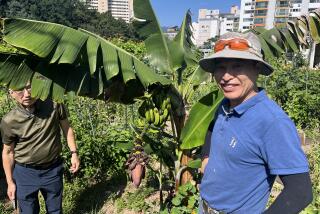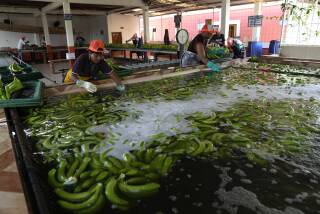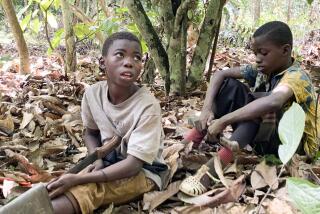Unlikely Banana Skirmish Slipping Toward Trade War
WASHINGTON — Crisis in Asia. Chaos in Russia. Turmoil in Brazil. Had enough? Well, here’s one more migraine headache for the world economy: bananas.
The United States and Western Europe are tangled up in a smoldering feud over a fruit they barely grow, that provides them with next-to-no jobs, that matters to only a few companies in each region and that nobody even pretends has a lot of strategic importance. Indeed, a 1995 mudslide in Ventura County led to the demise of one of the U.S. mainland’s last banana farms.
Just last week, a flurry of diplomatic shuffling in Geneva postponed a trade war between the world’s industrial superpowers. But the banana brouhaha continues, and the United States has targeted a list of European products for punitive, 100% tariffs.
Which prompts an obvious question, as diplomats struggle to find a way out of the volatile mess: How could a split over bananas raise the specter of a trade imbroglio between the world’s preeminent economies in a time of widespread financial jitters and, in the process, threaten the credibility of the global trading system?
“That’s our question too,” says Hugo Paemen, the European Union’s ambassador to the United States. “It’s hard to imagine.”
Sighs Jay Ziegler, spokesman for the U.S. trade representative: “This is the last issue we would have picked to have a high visibility trade dispute over. But the principle is important.”
On one side is the Clinton administration, long frustrated by Europe’s limits on banana imports from U.S.-owned plantations in Latin America. The United States is threatening steep tariffs on Italian prosciutto, British greeting cards, Louis Vuitton handbags from France, European chandeliers and an array of other products from across the Atlantic.
On the other side is the European Union, which last week asked a World Trade Organization panel to arbitrate the escalating flap and consider America’s case for imposing $520 million in penalties. U.S. officials say they expect to enact the tariffs March 3.
If the Europeans retaliate, as they hint they might, a trade war would have only negative consequences for the two regions on each side of the Atlantic that stand out as the world’s healthiest economies in a time of global uncertainty.
Moreover, how this dispute is resolved could say a lot about future controversies within the World Trade Organization. That includes a simmering U.S.-European tiff over exports of U.S. beef produced with growth-promoting hormones--ultimately, any trade practice that a nation finds unpalatable.
“It’s not just a banana issue,” declares Jeffrey J. Schott, a research fellow at the Institute for International Economics in Washington.
At the heart of the banana duel is a traditional Western European practice of preferential treatment for bananas grown in an assortment of former colonies in the Caribbean, Africa and the Pacific, and supplied by French and British firms operating in those countries.
The Europeans say these preferences, which involve quotas and licenses, have provided a worthwhile hand-up for needy, undeveloped countries. They also argue that they have modified their program and have asked the World Trade Organization to review it once more. Further, they note that despite the preferences, the majority of bananas in Europe’s kitchens still originate in Latin America and often are grown by the American firms.
But U.S. trade officials, backed by Cincinnati-based Chiquita, assail the scheme as a classic case of illicit protectionism. The Europeans have lost a series of banana rulings in world trade bodies, and many observers say the U.S. position is solid. But Europe continues to appeal and prevaricate, the U.S. complains.
“We can’t be suckers each time,” says Peter L. Scher, a U.S. trade official who is working on the matter. “At some point we have to say enough is enough.”
Whether Europe continues to resist these rulings, he and other Americans maintain, could have far-reaching effects on future trade disputes.
“Today, it’s bananas,” Scher declares. “In three months, it’s beef cattle. Later on, it could be automobiles. It could be any area.”
As trade confrontations go, the banana saga is unique. Neither the United States nor Europe has a lobby of banana fanatics, no banana constituency equivalent to Japanese rice growers or American soybean farmers or British coal miners. (Europe has some banana plantations in Spain, Portugal and Greece, and the United States still farms some bunches in Hawaii and Puerto Rico.)
Nor is there an issue of competitiveness. Bananas from the areas that enjoy special treatment are generally deemed inferior.
“I shouldn’t say it, but everybody knows they are not as good as the bananas from Latin America,” concedes Paemen, EU ambassador.
All of which greatly frustrates the one real U.S. constituency for tossing out Europe’s program--Chiquita Brands International Inc.
Chiquita continues to sell a lot of bananas in Europe, but its executives contend that European barriers have cost Chiquita greatly over the last several years in the form of lost sales and foreclosed chances to expand. Europe has historically offered trade preferences to the former colonies, including such banana outposts as Belize, Dominica and Grenada, although the formal U.S. challenges did not begin until 1992.
Overall, “there are lost opportunities that would add the damages up well in excess of $1 billion,” Steven G. Warshaw, president of Chiquita, said in an interview.
For their part, the Europeans complain that U.S. policy has been driven by the financial interests of Carl H. Lindner, Chiquita’s chairman and a big contributor to the Republican and Democratic parties. Lindner has found an ally in Senate Majority Leader Trent Lott (R-Miss.), who has expressed his concerns in letters to the office of the U.S. trade representative.
But U.S. trade officials insist that the flap is about matters far more high-minded than crass political influence, notably the credibility of the World Trade Organization to make its findings stick.
It’s “ridiculous” to think that Lindner is driving the process, Ziegler said.
Bananas are also an emotional cause in regions that have benefited from Europe’s preferences, areas largely remote from the modern riches of new technology and sophisticated know-how. In the Windward Islands, for example, bananas are known as “green gold.” They account for 90% of exports, 70% of foreign exchange earnings and 60% of agricultural employment, according to the Caribbean Banana Exporters Assn.
Not surprisingly, some warn that shelving Europe’s preferences could lead to social and economic disaster in the cluster of volcanic isles that were colonies of Britain and France. Bananas are especially appealing to small farmers of limited resources, because they can be grown on steep terrain and can bounce back relatively quickly after damaging floods and storms.
“Our banana pains continue to intensify, the prognosis appears to be very bleak,” lamented Allen Alpian, minister of foreign affairs of St. Vincent and the Grenadines, in a statement. “Our future is now on a life-support system.”
While European officials make much of the humanitarian aspect of their banana program, the policy of course benefits European companies. And they concede that loyalty toward the former colonies bumps up against trade guidelines.
The U.S. side retorts that there are ways to safeguard the Caribbean’s economic security without erecting illegal trade barriers.
To press its case, the Clinton administration formulated a list of products for 100% tariffs designed to punish key members of the European Union without inadvertently harming U.S. interests.
The $520-million list--a dollar figure presumed to equal the annual U.S. loss due to Europe’s policies--encompasses products as varied as sweet biscuits, candles, lithographs, batteries, Pecorino cheese and tea.
The roster itself reflects a careful exercise in balancing pros and cons. Thus pens were removed after U.S. officials concluded it would hurt Boston-based Gillette, which owns Parker pens in Britain. Various American wine interests persuaded the government to keep their products off the list as well, noting that wine is caught up in separate labeling disputes and other issues.
Denmark and the Netherlands were kept off the hit list, because they have opposed the banana preferences. Sanctions could have particular impact in major European economies, such as Britain, Italy and France. Others might not feel a pinch.
Said one U.S. official involved in the process: “It’s kind of hard to get at Luxembourg.”
More to Read
Sign up for Essential California
The most important California stories and recommendations in your inbox every morning.
You may occasionally receive promotional content from the Los Angeles Times.










